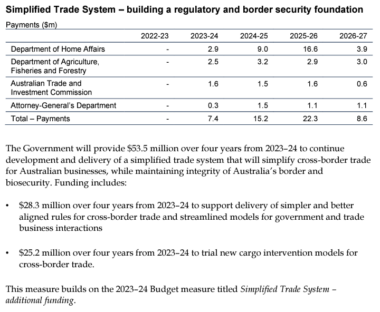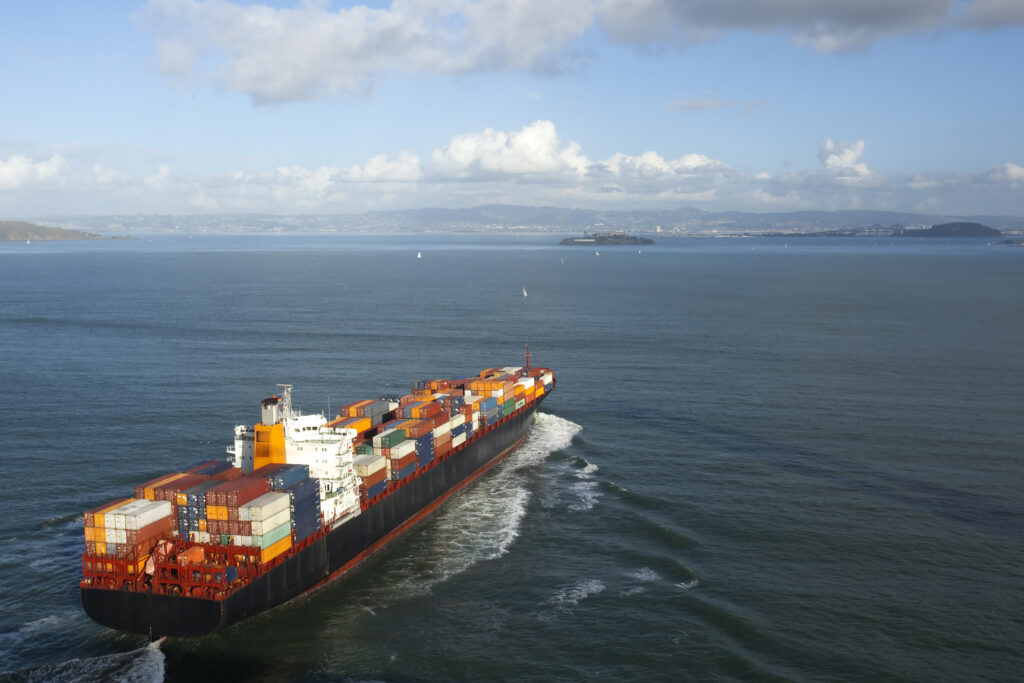On 13 December 2023, the federal government released its 2023-24 Mid-Year Economic and Fiscal Outlook (MYEFO). While it is a report on progress following the budget from May 2023, in many ways it is also a half-year report card on the economic state of the nation compared to the anticipated outcomes set out in the previous budget. In general terms, the response to this MYEFO has been positive with the economy appearing to be in a better state than had been anticipated.
However, for many of those in industry, we were keen to see any announcements on the funding for the future pathway relating to trade modernisation and facilitation.
The MYEFO contained the following reference as to funding of the Simplified Trade System (STS).

Source: The Commonwealth of Australia.
The MYEFO did not break down or describe the way in which the funding would be allocated in the STS agenda. Some more detail was provided in an email from the STS Implementation Taskforce (Taskforce) later on 13 December 2023, which described how the funding was to be allocated as set out below:
“The Government has released the 2023-24 Mid-Year Economic and Fiscal Outlook (MYEFO), reaffirming its commitment to trade modernisation.
An additional $53.5 million over four years from 2023–24 to implement a raft of cross-border reforms under the Simplified Trade System (STS), including:
- Development of a 3-year roadmap to progressively align, simplify and modernise regulation and processes, including for permits, reporting and compliance.
- A commitment to explore options to adopt legislation aligned to the United Nations Commission on International Trade Law Model Law on Electronic Transferable Records (MLETR), an important enabler for paperless trade.
- Introduction of legislative amendments to modernise and strengthen the customs licensing regime and digitise processes for the return of seized goods.
- Funding to commence trials and co-design activities with industry to develop new cargo intervention models for Australia’s high-volume sea and air ports.
These initiatives will build on the suite of reform work already underway:
- A whole-of-government border controls policy framework to reduce inconsistent and/or duplicative requirements in border control processes.
- A trade identity policy framework, to allow businesses and individuals to verify their identity securely and efficiently.
- Improving the Fit and Proper Persons (FPP) assessment experience, saving time and money for businesses working in regulated areas of cross-border trade.
- Supporting enhanced data sharing between government agencies with the aim of ultimately benefiting importers and exporters by enabling the more efficient movement of goods across the border.
This additional investment continues to ensure the Australian Government is well placed to deliver transformational change in the future and best positioned to drive long-term, sustainable reform and modernise our systems.”
The commitment to the STS agenda in the MYEFO is welcome, especially as it anticipated the continuation of the involvement of the Taskforce as a ‘whole of government’ body reviewing the work of other government agencies as well as initiating its own work. Ideally, the Taskforce is eventually established as a permanent agency working across all government agencies. Most of the initiatives are those on which government agencies and the private sector have already undertaken discussions and some of these may be tested through the ‘regulatory sandbox’ which will be operated by the Australian Border Force (ABF) commencing early in 2024.
There is one specific area of concern for industry with the proposal for the introduction of legislative amendments to modernise and strengthen the customs licensing regime. This is something of a surprise and has been met with some concern by those whose operations require licences issued and administered by the ABF which includes licensed customs brokers and operators of depots and warehouses. The licensing regime for these parties is already very prescriptive with recent changes to warehouse and depot warehouses and extensive discussions with the ABF for further additional conditions for licensed customs brokers. Given the nature of the comments in the email from the Taskforce, the concern is whether even further regulation is being contemplated. Not only would more regulation create more complexity for operations, but it may act as a deterrent to entry into the industry.
Contact us
If you would like to discuss any aspects of the MYEFO and funding of the STS, or assistance in addressing any current trade or supply chain issues your business is facing, please contact a member of our Customs & Trade team.
| Disclaimer: This publication contains comments of a general nature only and is provided as an information service. It is not intended to be relied upon, nor is it a substitute for specific professional advice. No responsibility can be accepted by Rigby Cooke Lawyers or the authors for loss occasioned to any person doing anything as a result of any material in this publication.
Liability limited by a scheme approved under Professional Standards Legislation. ©2023 Rigby Cooke Lawyers |
